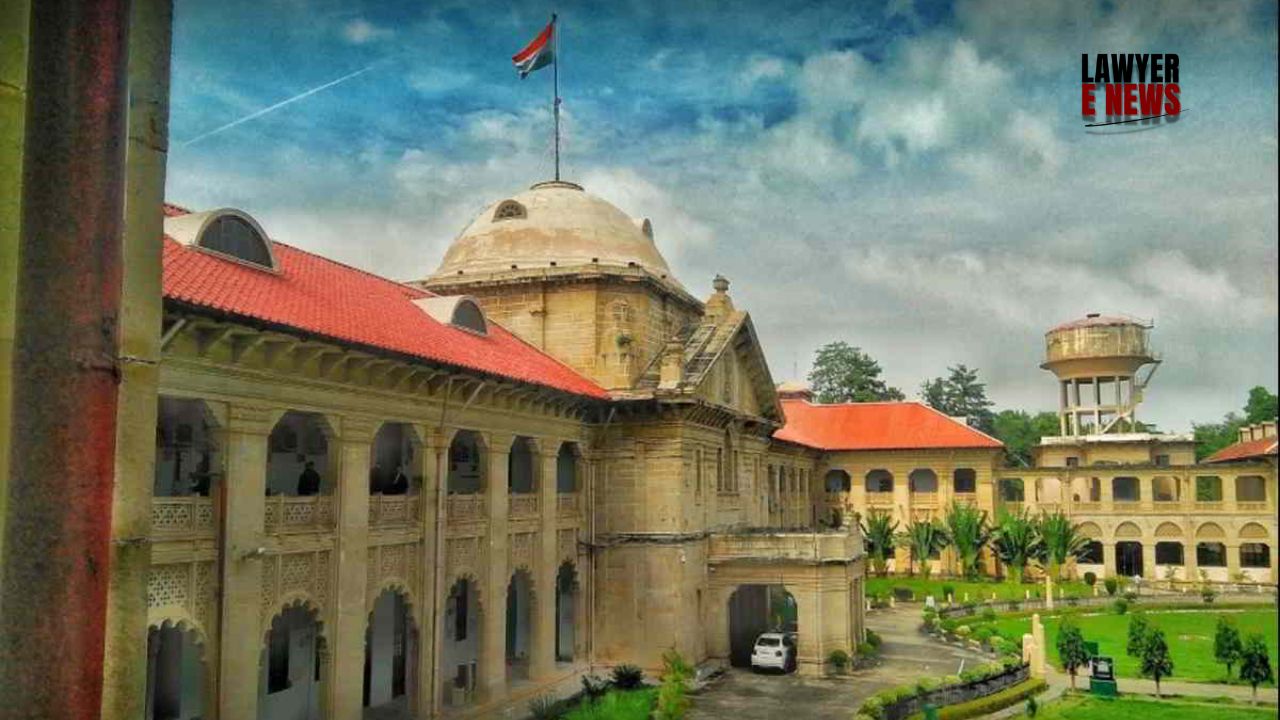-
by Admin
15 February 2026 5:35 AM



Allahabad High Court, in the case of Ankur Agarwal vs. State of U.P. Through Prin. Secy. Home, Lucknow & Another, delivered a significant judgment granting anticipatory bail to the applicant despite the issuance of non-bailable warrants and the initiation of proceedings under Section 82 of the Code of Criminal Procedure (CrPC). The case involved allegations of fraud in a land transaction, where government land recorded as banjar in revenue records was sold fraudulently. The court, in its detailed judgment, discussed the legal issue of whether anticipatory bail can be granted under such circumstances and held that exceptional circumstances warranted relief.
The applicant, Ankur Agarwal, sought anticipatory bail in connection with FIR No. 817 of 2023 registered at Police Station Kotwali Nagar, Gonda, under Sections 419, 420, 467, 468, 471, and 129-B of the Indian Penal Code (IPC). The FIR alleged that co-accused Jawahar Lal had executed fraudulent sale agreements for government land classified as banjar, including one agreement in favor of the applicant. The applicant claimed to have paid part of the sale consideration but later realized the fraud and initiated civil proceedings for cancellation of the sale agreement. His anticipatory bail plea was earlier rejected by the Sessions Court on November 16, 2023.
The key legal issue was whether anticipatory bail could be granted to the applicant after non-bailable warrants were issued and proclamation proceedings under Section 82 CrPC were initiated. The State opposed the bail, citing precedents such as Lavesh vs. State (NCT of Delhi) (2012) and Srikant Upadhyay vs. State of Bihar (2024), where the Supreme Court had held that absconding persons against whom proclamations are issued are not ordinarily entitled to anticipatory bail.
However, the court clarified that while such principles generally apply, there is no absolute bar against granting anticipatory bail after issuance of a proclamation under Section 82 CrPC if exceptional circumstances exist. The court cited the landmark judgment in Sushila Aggarwal vs. State (NCT of Delhi) (2020), which held that the power to grant anticipatory bail under Section 438 CrPC is discretionary and should be exercised in appropriate cases based on the specific facts.
Exceptional Circumstances Justifying Anticipatory Bail
Court Finds Applicant to be a Victim of Fraud, Not a Perpetrator
In this case, the court observed that the applicant had paid ₹5,00,000 for the land and had filed a civil suit for cancellation of the fraudulent sale agreement. Additionally, the applicant had neither taken possession of the disputed land nor acquired any title over it. Importantly, the co-accused, including the seller of the land, had already been granted bail, and the applicant had filed an application under Section 156(3) CrPC seeking action against the seller. These factors led the court to conclude that the applicant appeared to be a victim of fraud rather than a participant in the illegal transaction.
The court analyzed several Supreme Court judgments, including:
Lavesh vs. State (NCT of Delhi) (2012) – The Supreme Court held that anticipatory bail should generally not be granted to proclaimed offenders unless there are exceptional circumstances.
Sushila Aggarwal vs. State (NCT of Delhi) (2020) – The Supreme Court ruled that anticipatory bail can be granted in appropriate cases without imposing rigid conditions, even after proclamation under Section 82 CrPC.
Srikant Upadhyay vs. State of Bihar (2024) – The court reiterated that anticipatory bail is an extraordinary remedy but can be granted in extreme cases, even after the issuance of warrants or proclamations.
The Allahabad High Court found that the facts of the case presented exceptional circumstances that justified the grant of anticipatory bail. The applicant had not absconded but had actively pursued legal remedies, including civil litigation to annul the fraudulent sale agreement. The co-accused had already been granted bail, and the applicant was not in possession of the disputed property.
The court, therefore, allowed the application for anticipatory bail, subject to several conditions to ensure the applicant’s cooperation with the investigation. The conditions included:
Regular appearance before the trial court,
No tampering with evidence or influencing witnesses,
Surrender of passport and prohibition from leaving the country without prior permission.
In this judgment, the Allahabad High Court reaffirmed that anticipatory bail remains a discretionary remedy, which can be granted in exceptional cases even after non-bailable warrants and Section 82 CrPC proceedings are initiated. The ruling sets a significant precedent by highlighting that the courts must carefully weigh the facts of each case to ensure justice is served, especially when the applicant appears to be a victim of fraud rather than a perpetrator.
Date of Decision: October 21, 2024
Ankur Agarwal vs. State of U.P. Through Prin. Secy. Home, Lucknow & Another
